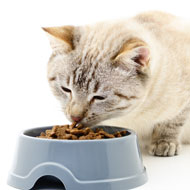Pets at Home recalls cat food due to low thiamine levels

Pets at Home has sent a notification to all vets to be aware of the atypical symptoms and potential for thiamine deficiency.
Pets at Home has recalled four of its dry cat food products after tests confirmed that they contain lower levels of thiamine (vitamin B) than is specified in the recipe.
The affected products are:
- AVA Veterinary Approved Grain Free Mature 7+ Cat Food Optimum Health (2kg).
- Product code: 7120400
- AVA Veterinary Approved Grain Free Mature 7+ Cat Food Optimum Health (4kg)
- Product code: 712401
- AVA Veterinary Approved Grain Free Senior 12+ Cat Food Optimum Health (2kg)
- Product code:712402
- AVA Veterinary Approved Grain Free Adult Cat Food Indoor/Neutered (1.5kg)
- Product code: 712407
Writing on its Facebook page, the retailer said that it became aware of the problem when three cats became seriously unwell after their owners switched to the affected products.
‘All three cats exhibited symptoms of sudden collapse, fitting, widespread twitching and general unsteadiness which are not the classic symptoms of thiamine deficiency’ they write.
‘As pet lovers ourselves we recognise that you will be concerned about your own cat. If you have concerns that your cat may be showing any of these symptoms after switching to one of the four affected products then you should stop feeding and seek immediate veterinary advice.’
Pets at Home has sent a notification to all vets to be aware of the atypical symptoms and potential for thiamine deficiency. Point of sale notices have also been placed in all affected stores and information has been made available on its website.
The retailer urges anyone who has purchased any of the listed products to return it to where they bought it for a full refund or call 0200 328 4204.



 The latest
The latest